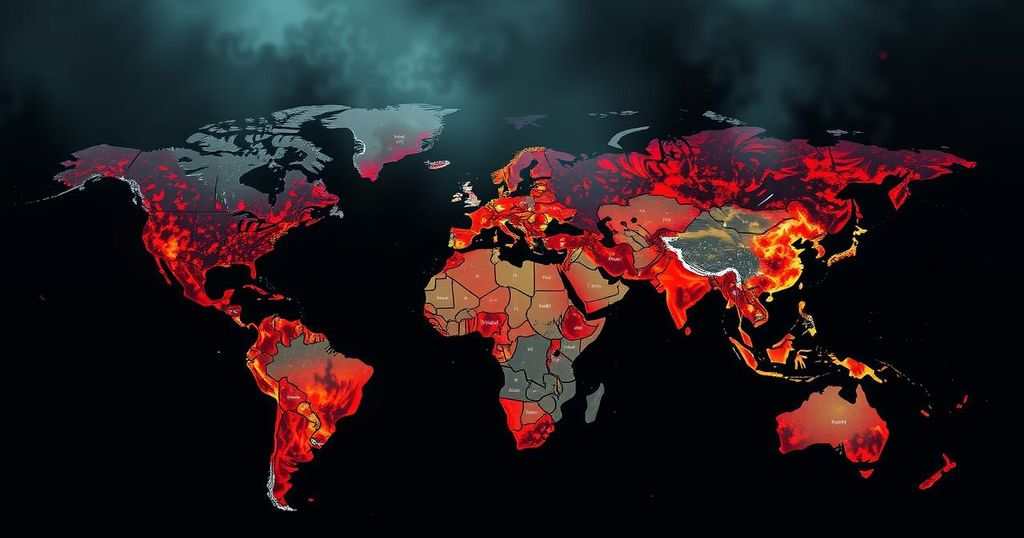The humanitarian crisis of 2024 sees a bleak milestone with 281 aid worker fatalities, marking it as the deadliest year recorded for humanitarian personnel. Key regions impacted include Gaza, Lebanon, Haiti, Ukraine, and Guinea, with increasing violence and restricted access severely hampering emergency aid efforts. As winter approaches, urgent shelter and basic needs remain critical across these conflict-stricken areas.
In a tragic report by the United Nations Office for the Coordination of Humanitarian Affairs (OCHA), 2024 has recorded the highest number of deaths among aid workers, with 281 fatalities highlighted as of the present date. This grim statistic reflects the horrifying reality that humanitarian personnel are increasingly targeted amidst growing global conflicts, especially highlighted by the escalating violence in Gaza. The consequences of this violence are dire, as humanitarian efforts are severely restricted, further exacerbating the suffering of vulnerable populations in conflict zones such as the Occupied Palestinian Territories, Lebanon, Haiti, Ukraine, and Guinea.
The ongoing conflict in Gaza has rendered humanitarian access increasingly difficult, with only a fraction of planned emergency missions successfully completed. Recent attacks have led to significant casualties among civilians, including children, as aerial strikes have caused widespread destruction. As a result, a critical need for shelter and basic supplies intensifies as winter approaches, with hundreds of thousands left homeless without access to necessary resources. Additionally, aid operations in northern Gaza remain severely hampered by ongoing military actions.
In Lebanon, the situation mirrors that of Gaza, as relentless airstrikes and escalating violence are inflicting severe harm on civilians and essential health services. The World Health Organization reports numerous attacks on healthcare facilities, leading to devastating losses among medical personnel. Humanitarian agencies are responding with winter assistance and food supplies, yet the safety of civilians remains in jeopardy as hostilities continue unabated.
Haiti’s humanitarian crisis has also escalated, with thousands displaced due to violence from armed groups. The UN and affiliated organizations are striving to address urgent needs for water and healthcare despite a precarious security situation. Meanwhile, the conflict in Ukraine remains acute, with ongoing attacks on energy infrastructures leading to further humanitarian needs. The UN continues to deliver critical supplies amid rising casualties.
In Guinea, flooding has affected over 175,000 individuals, leading to significant displacement and damage to infrastructure. The Emergency Relief Coordinator has allocated funds to aid the most impacted communities, aiming to provide essential support in health, food, and water services. As these interconnected humanitarian crises unfold, the UN remains resolute in its commitment to assist countless individuals in dire need across these regions.
The evolving humanitarian landscape draws significant attention to regions afflicted by conflict, watershed events, and natural disasters. Underlying issues include warfare, violence against civilians, and compromised humanitarian access driven by military actions and civil unrest. The UN’s reporting, particularly through OCHA, underscores the peril faced by humanitarian workers and the desperate conditions of affected populations, necessitating immediate global awareness and response. Each region—be it Gaza, Lebanon, Haiti, Ukraine, or Guinea—highlights unique challenges but collectively point to a dire need for enhanced protection for both civilians and aid workers in a world where humanitarian principles are increasingly under threat.
In summary, the global humanitarian crisis is exacerbated by ongoing violence and political instability, leading to unprecedented risks for aid workers and vulnerable populations alike. The statistics reflect not just numbers, but the lives lost and irrevocable damage to health and infrastructure across affected areas. Coordinated international efforts to protect humanitarian operations and deliver essential support are critically required now more than ever as communities reel from the impacts of conflict and disaster.
Original Source: www.unocha.org






